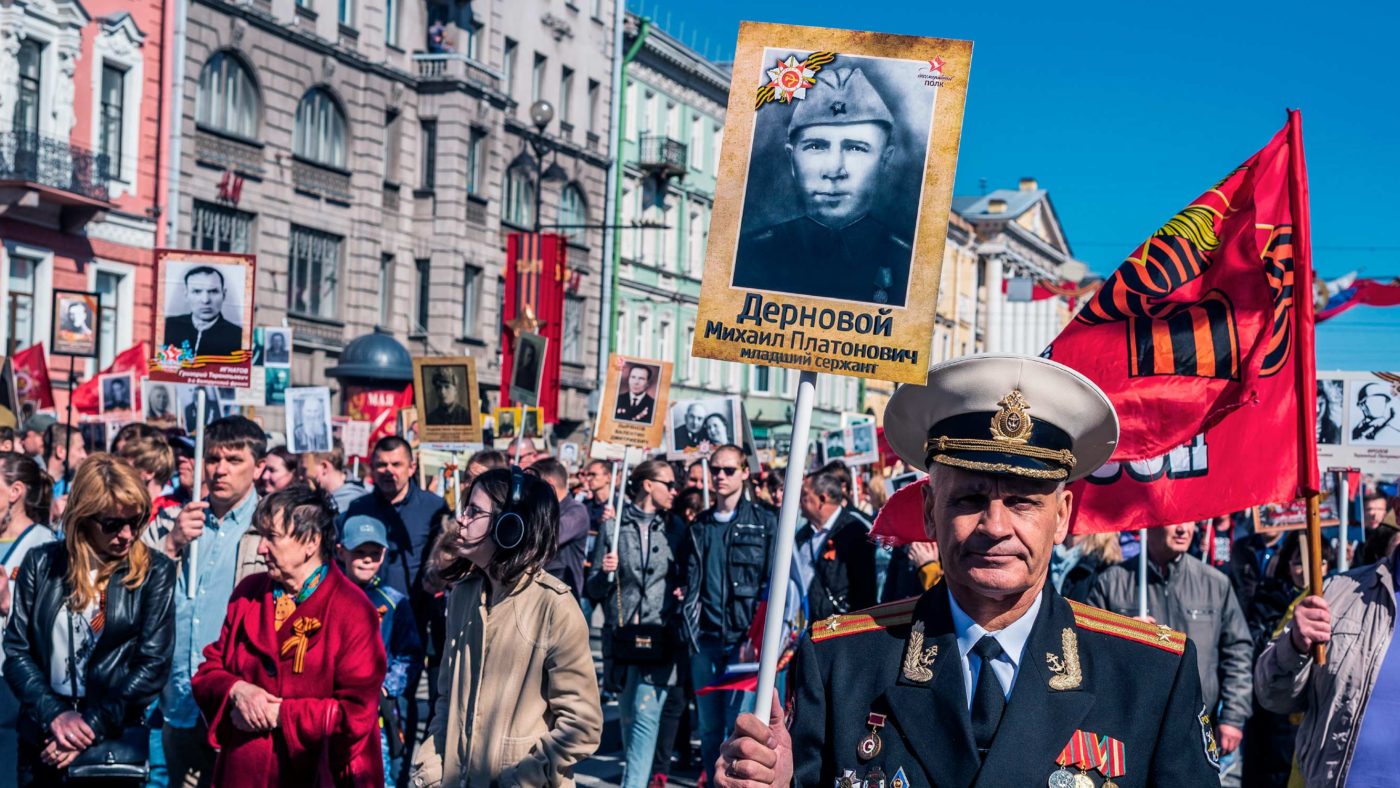On Sunday, Russia will celebrate 76 years since the end of World War Two. As time passes, and the number of veterans dwindles, the Kremlin is ever more strident in its efforts to co-opt the war memory for its own political purposes.
Since 2012, Putin’s governments have spent hundreds of billions of roubles annually on military history clubs and camps, children’s war tourism, films, TV series, books, statues, museums, exhibitions – even street murals – dedicated to World War Two. From 2016 onwards, more money has been allocated to initiatives that inculcate a ‘patriotic’ view of the past than to the commemorations themselves.
The Russian government’s turn to history is understandable: it is difficult to cohere a vast nation comprising over 190 ethnic groups. For various reasons, civic identify, ethno-nationalism and ideology are not viable unifiers in Russia. Instead, the Kremlin has opted for a hodgepodge narrative of ‘1,000 years’ of Russian history that centres around the Great Patriotic War – the term for the Soviet war experience from 1941-1945.
In part, the Kremlin is responding to popular demand. Some 89% of Russians say the Soviet victory over Nazism is the thing that makes them most proud of their country. Victory Day is known in Russia as the ‘holiday with tears in your eyes’, reflecting the appalling scale of loss that saw 27 million Soviet citizens die between 1941-1945.
Unfortunately, this real memory is often lost in the Kremlin’s distorted and Soviet-influenced narrative of the past – an account with no space for the Molotov-Ribbentrop Pact, mass rapes, or the disastrous retreat of 1941. In place of history, there is patriotic mythstory, interlacing tales of Russian victimhood and heroism.
The Russian government decries any challenges to this narrative as an attack not only on the Great Victory but on the Russian people, culture, and nation itself. For example, Russia’s national security strategy and information security doctrine depict historical falsification as a near-existential threat. In recent years, the Kremlin has codified their narrative of the war. Article 354.1 of the Criminal Code prohibits the dissemination of false information about Soviet activities in World War Two. Recent amendments to the constitution, approved in July 2020, enshrined in law the state’s duty to protect ‘historical truth’. In 2016, a man was convicted for stating that Nazi Germany and Soviet Russia had cooperated and attacked Poland in 1939.
Such laws and cases create a stifling atmosphere of self-censorship among historians and journalists working on related themes. In a country where the Great Patriotic War is central to regime legitimacy, a ‘politically incorrect’ research topic could end your career.
The Kremlin has tried to wield this power against political opponents too; take the recent trial of Aleksei Navalny for ‘slandering a veteran’, after he criticised the ruling party’s use of veterans for political gain.
Naturally, the Kremlin also looks abroad to identify the ‘enemies of historical truth’, with the Ministry of Foreign Affairs frequently engaging in memory wars with the Baltics, Ukraine, Georgia, Moldova, and Poland. Meanwhile, Russian politicians deploy World War Two as a near-constant analogy through which to historically frame ongoing diplomatic and military conflicts.
The most egregious use of this ‘historical framing’ is the war in eastern Ukraine, which Russian state-aligned media have depicted as rerun of the Great Patriotic War, casting pro-Russian separatists as heirs to the Red Army fighting off Nazi and collaborationist bandits from western Ukraine.
However, the West is also a target of Russian ire, with the Putin regime claiming that we turn a blind eye to the rehabilitation of Nazi collaborators in Eastern Europe and that we have forgotten the Soviet role in World War Two. They do have a point here. Only 15% of Americans and 11% of Britons think the USSR played the most important role in defeating the Nazis – a lack of recognition that is hurtful to many Russians.
Given the significance and prominence of the war in Russian political culture and discourse, the UK and USA, as former Allies, should fashion a more consistent response to the Kremlin’s tactics. This should be sensitive to the meaning of the war to ordinary Russians, especially young people, who are proud of the Soviet victory but, unlike the government, do not wish to relive or endlessly repeat the memory.
On anniversaries like May 9 or June 22, British and American politicians should send a message that they remember and honour the Soviet sacrifice. While this should not involve visiting the militaristic Victory Day parade in Moscow, senior ministers, ideally the Prime Minister and President, should lay a wreath at relevant memorials in their own country and send wreaths to Moscow – and other countries of the former Soviet Union – to be laid outside the eternal flame.
There are potential soft power gains here but, much more importantly, there is a strong moral imperative: the 27 million Soviet citizens who died in World War Two deserve a better legacy than to be forgotten abroad and used to justify repression at home.
Click here to subscribe to our daily briefing – the best pieces from CapX and across the web.
CapX depends on the generosity of its readers. If you value what we do, please consider making a donation.


